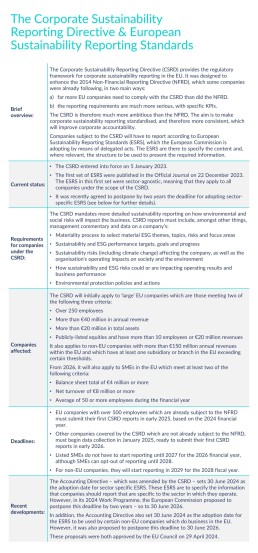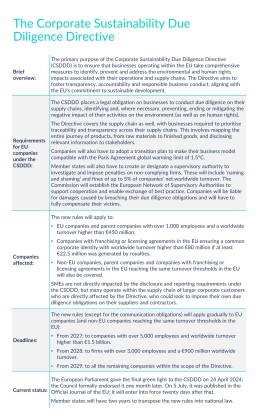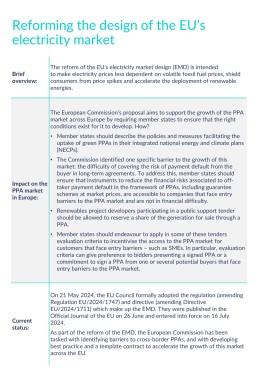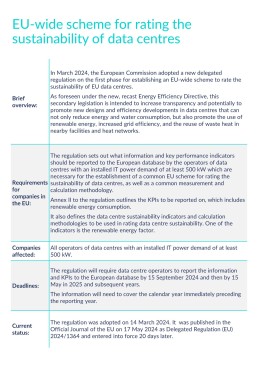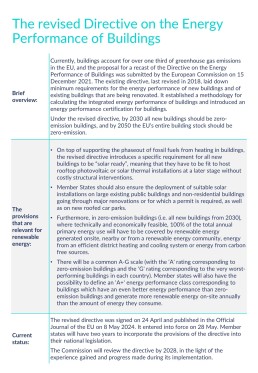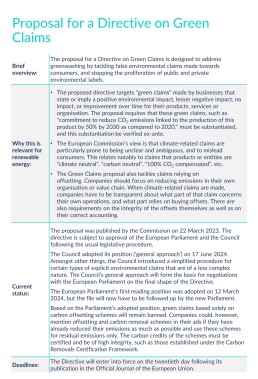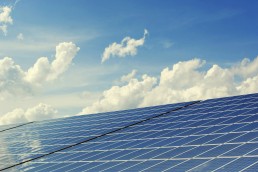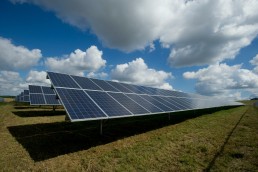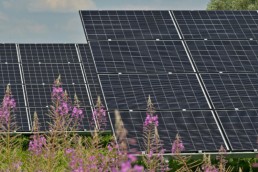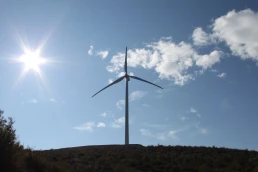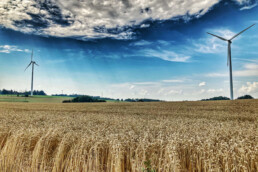In the last article in this series, we took a deep-dive into the telecommunications industry, a sector which, according to industry estimates, accounts for 1-2% of all energy consumed globally – and which is amongst the fastest-growing for renewable energy power purchase agreements (PPAs).
In that piece, we identified three of the most important factors driving the interest from telecoms companies in PPAs – to summarise:
- Telecoms operators use a lot of electricity, and decisions over renewable power cannot wait if the sector is to meet its sustainability commitments
- Renewable energy buying is being driven by the search for cost savings
- European regulations are driving change
This time, we are going to consider this final point in more detail, but in a broader context: which regulations, directives and other EU initiatives are – or will be – the most important in encouraging European companies across all industry sectors to switch to buying more clean power?
A complex landscape
When it comes to the decarbonisation agenda, the regulatory context has been moving rapidly since the European Green Deal was first presented in December 2019 – and particularly since the ‘Fit for 55’ package was proposed by the European Commission in 2021.
Our aim here is not to summarise all of the various pieces of legislation that are designed to accelerate the energy transition and reduce emissions. Instead, we will narrow the focus down – we will:
- concentrate on those regulations, directives and other EU initiatives which are specifically designed to encourage European companies to procure more clean power.
- consider legislative proposals which have not yet been approved, and legislation which has been approved but is not yet fully in force – so where some of the obligations on companies are still pending (i.e. we will not focus on directives and regulations which have already been implemented in full and where the obligations on companies are already in force).
If you apply those two ‘filters’, there are six pieces of legislation which will be the most important in encouraging companies to switch to renewable energy:
- The Corporate Sustainability Reporting Directive & the European Sustainability Reporting Standards
Sustainability reporting sits at the heart of the EU’s green strategy, and the Corporate Sustainability Reporting Directive (CSRD), which entered into force in January 2023, provides the regulatory framework for it. Companies subject to the CSRD will have to report according to European Sustainability Reporting Standards (ESRS), which the European Commission is adopting by means of delegated acts. The first set of ESRS were published in December 2023.
Here is a more detailed overview of the CSRD and ESRS:
- The Corporate Sustainability Due Diligence Directive
The Corporate Sustainability Due Diligence Directive (CSDDD) sets obligations for large companies regarding actual and potential adverse impacts on human rights and the environment, with respect to their own operations, those of their subsidiaries, and those carried out by their business partners:
- Reforming the design of the EU’s electricity market
In March 2023, the European Commission proposed a reform of the EU electricity market, with the aim of reducing price volatility for consumers and creating favourable conditions for investors in renewable energy. The reform includes two legislative proposals – one on electricity market design and the other on protection against wholesale energy market manipulation. One of the objectives is to support the use of more long-term instruments such as PPAs and contracts for difference (CfDs):
- EU-wide scheme for rating the sustainability of data centres
We referenced this in the previous article in this series, but on 14 March 2024, the European Commission adopted a new delegated regulation on the first phase for establishing an EU-wide scheme to rate the sustainability of EU data centres. With data centres estimated to account for close to 3% of EU electricity demand – a figure which is likely to significantly increase in the coming years – the scheme is intended to increase efficiency developments and to promote the use of renewable energy:
- The revised Directive on the Energy Performance of Buildings
The revised Directive on the Energy Performance of Buildings entered into force on 28 May 2024. It is relevant for companies’ use of renewable energy because it introduces a specific requirement for all new buildings to be “solar ready”, and will ensure a much wider roll-out of solar installations on buildings and renewable energy capacity on-site:
- Proposal for a Directive on Green Claims
The proposal for a Directive on Green Claims is designed to address greenwashing. It is relevant to renewable energy because it tackles claims which rely on offsetting, emphasising the need for companies to focus on reducing emissions in their own organisation and value chain:
The regulatory landscape is making the transition to renewable energy a more and more urgent priority for companies across the EU
Since the European Parliament elections last month, there has been much talk about the ‘shift to the right’, with populist parties gaining seats across the EU – and what it might mean for the future of the Green Deal.
However, as will be clear from the overview above, much of the regulatory environment which is designed to encourage European companies to procure renewable energy is already in place – and it will not be unpicked by the new Parliament. The obligations on companies operating in the EU are coming, and as the deadlines approach, so the need to switch to clean power will only become more urgent.
What’s coming up next time?
Next time, we will be taking another sector deep-dive, this time into the industry which is leading the way when it comes to the amount of capacity that has been contracted through green PPAs: information & communications technology (ICT)…
You might also like
16 October 2024
Rezolv Energy secures up to €90 million in debt financing from the IFC and Raiffeisen Bank International for the St. George solar park in Bulgaria
Rezolv Energy, an independent power producer backed by Actis, has secured up to €90 million in debt financing from the International Finance Corporation (IFC) and Raiffeisen Bank International to support the construction of the ‘St. George’ solar park in north-eastern Bulgaria.
30 September 2024
Rezolv Energy and A2A sign Virtual Power Purchase Agreement for 150 GWh of wind energy in Romania
A2A, an Italian group active in the energy, water and environment sectors, has signed a 7-year Virtual Power Purchase Agreement (VPPA) with Rezolv Energy, an independent power producer backed by Actis.
18 September 2024
ICT companies should act now to secure the green power needed for data centre growth
In the last article in this series, we explored the regulations, directives and other EU initiatives which are – or will be – the most important in encouraging European companies to switch to buying more renewable power.
6 September 2024
Ardagh Glass Packaging-Europe enters Bulgarian renewable energy market by signing Virtual Power Purchase Agreement with Rezolv Energy
Ardagh Glass Packaging-Europe (AGP-Europe), an operating business of Ardagh Group, announced today that it has entered a long-term Virtual Power Purchase Agreement (VPPA) with Rezolv Energy’s St. George solar photovoltaic (PV) project in Bulgaria, securing renewable electricity for its glass manufacturing operations across Europe from April 2026.
6 September 2024
Rezolv Energy hands contracts to three companies, including Solarpro and CMC Europe, to build the ‘St. George’ solar park in Bulgaria
Actis-backed Rezolv Energy has selected three companies – CMC Europe, Solarpro and Green Solar Energy – to build the 229MW ‘St. George’ solar park in Silistra Municipality in Northeastern Bulgaria. Construction work is due to start very shortly, with the plant coming onstream next year.
11 July 2024
Why is the telecoms industry amongst the fastest-growing sectors for renewable energy PPAs?
In the last article in this series, we took the first of several deep-dives we will be taking into industry sectors which are heavily impacted by the energy transition – and which are driving demand for renewable energy power purchase agreements (PPAs) in Central & South Eastern Europe.
4 July 2024
Bekaert and Rezolv Energy sign 100 GWh wind Power Purchase Agreement in Romania
Bucharest, 4 July 2024: Rezolv Energy, the Actis-backed independent power producer in Central and Southeastern Europe, through their project subsidiary First Looks Solutions S.R.L., have signed a 10-year Virtual Power Purchase Agreement (VPPA) in Romania with Bekaert, a global leader in steel wire transformation and coating technologies.
19 June 2024
T-Mobile Czech Republic, Slovak Telekom and CE Colo sign pioneering cross-border virtual Power Purchase Agreements with Rezolv Energy
Major deal will see the Deutsche Telekom companies buy 100GWh of clean power per annum for 12 years
The deal, the first cross-border virtual Power Purchase Agreements signed by Czech or Slovak companies, will enable the construction of the one of Europe’s largest onshore wind farms.
17 June 2024
Rezolv Energy & Low Carbon hand Vestas EPC contract for VIFOR wind farm in Romania
Bucharest, 17 June 2024: Actis-backed Rezolv Energy and Low Carbon, through their project subsidiary First Looks Solutions S.R.L., have selected Vestas as the engineering, procurement and construction (EPC) partner for the first phase of the ‘VIFOR’ wind farm in Buzău County, Romania. Phase 1 will install 192MW in capacity, with planned expansion to 461MW in Phase 2.
